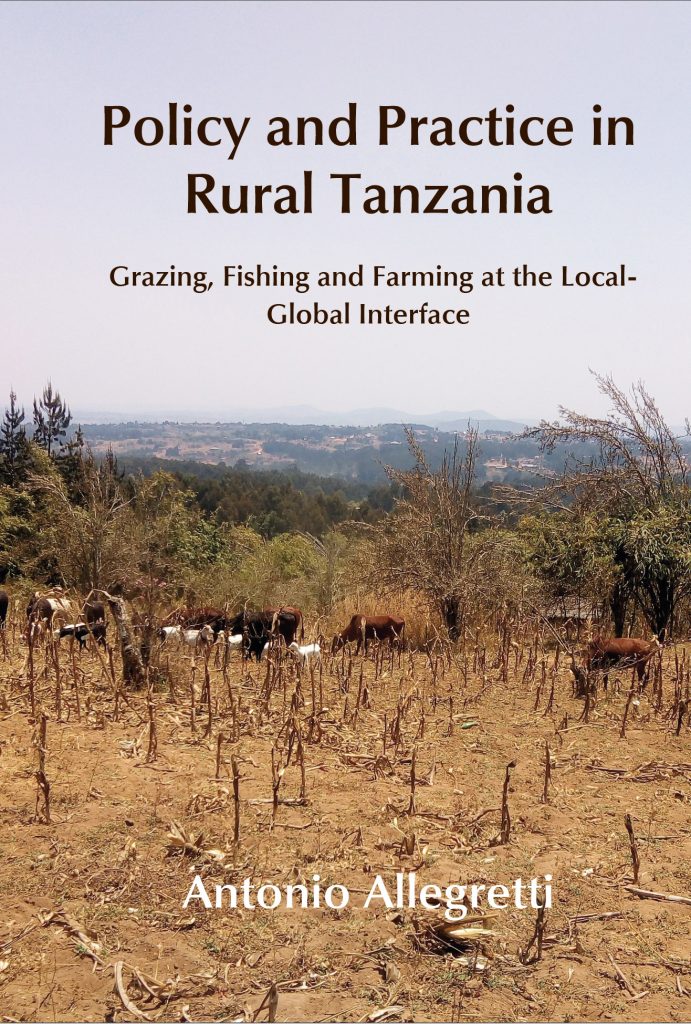Policy and Practice in Rural Tanzania
Grazing, Fishing and Farming at the Local–Global Interface
Antonio Allegretti
The book sets aside the dichotomies that have long confused rather than clarified understanding of the dynamics of rural communities: ‘tradition’ versus modernity, subsistence versus commoditisation, and indigenous versus scientific knowledge. … This work uses ethnographic methods to reveal the pragmatic motivations that guide herders, fishers, and farmers as they engage on their own terms with markets, government officers, development projects and cultural innovations while pursuing and safeguarding their livelihoods.
John G. Galaty, Nomadic Peoples

A blend of old and new meanings
Who are the rural people of Africa? What does it mean to be part of a ‘rural’ community in contemporary Tanzania? And why is it important to debate questions of African rurality beyond the mere GDP contribution of rural land-based production? This book seeks to address questions like these. Rural people(s) in contemporary Africa are often conceived of in terms of how to efficiently integrate them into international markets and global value chains; this book analyses the question of integration of rural people in Tanzania by delving into how they deal with local-global connections and engage with policy objectives on their own terms, between local forms of associational life and global markets. In so doing, it explores local socio-economic dynamics that find little space in the national and global policy vision of a rural sector geared towards growth – a vision that is peculiar to African states, including Tanzania.
Informed by anthropological theory and de-re-agrarianisation/de-re-peasantisation debates, and grounded in ethnographic evidence, the book eschews ‘orthodox’ approaches that see (rural) people as passive recipients of policies, and policies as instruments of oppression. Instead, it departs from the rural land/place-based practices of grazing, fishing and farming to look at rurality in Tanzania as a blend of old and new meanings, values and practices at the local-global interface, continually reshuffled as rural people encounter different social and economic spheres. As the world rediscovers the urgency of questions connected to neo-colonialism and de-colonisation, this book brings to the forefront the position, worldview and ambitions of African rural peoples intersecting with international policy models, visions and objectives.
THE AUTHOR
Antonio Allegretti (Ph.D. Manchester) is an anthropologist and a Senior Research Associate in the Lancaster Environment Centre, Lancaster University. He works at the crossroads of development, academic and policy-oriented research in East Africa (Tanzania and Kenya), having spent many years working with rural communities of pastoralists, fishermen and farmers in the region. He has done academic research on rural livelihoods and economies and contributed to multi-stakeholder policy debates around community-based climate adaptation and resilience, and water management. His current work at Lancaster University focuses on governance of small-scale fisheries and the role of fish for food and nutrition security among vulnerable rural communities of East and West Africa.
Open Access through the support of Lancaster University Library.
CONTENTS
INTRODUCTION
GRAZING. PEOPLE, METHODS, FIELDWORK
CHAPTER ONE. Becoming Maasai in Tanzania: the rise of Maasai ethnic identity and the Maasai trader in the market economy
CHAPTER TWO. Respatializing culture, recasting gender: Maasai ethnicity and the ‘cash economy’ at the rural-urban interface
CHAPTER THREE. ‘Being Maasai’ in markets and trade: ethnicity-based institutions in the livestock market
FISHING. PEOPLE, METHODS, FIELDWORK
CHAPTER FOUR. “We are here to make money”: New terrains of identity and community in small-scale fisheries in Lake Victoria
FARMING. PEOPLE, METHODS, FIELDWORK
CHAPTER FIVE. Drawing from the science ‘basket‘: farmers‘ embedded knowledge and technology between performance, identity, and the agricultural expert
CHAPTER SIX. Climbing the vertical chain: what ‘integration‘ for the rural entrepreneur?
CHAPTER SEVEN. Making policy: recrafting ethnographic research for participation
CONCLUSION
Published 1st April 2022.
ISBN 978-1-912186-26-6 (HB) £65. 208 pages
